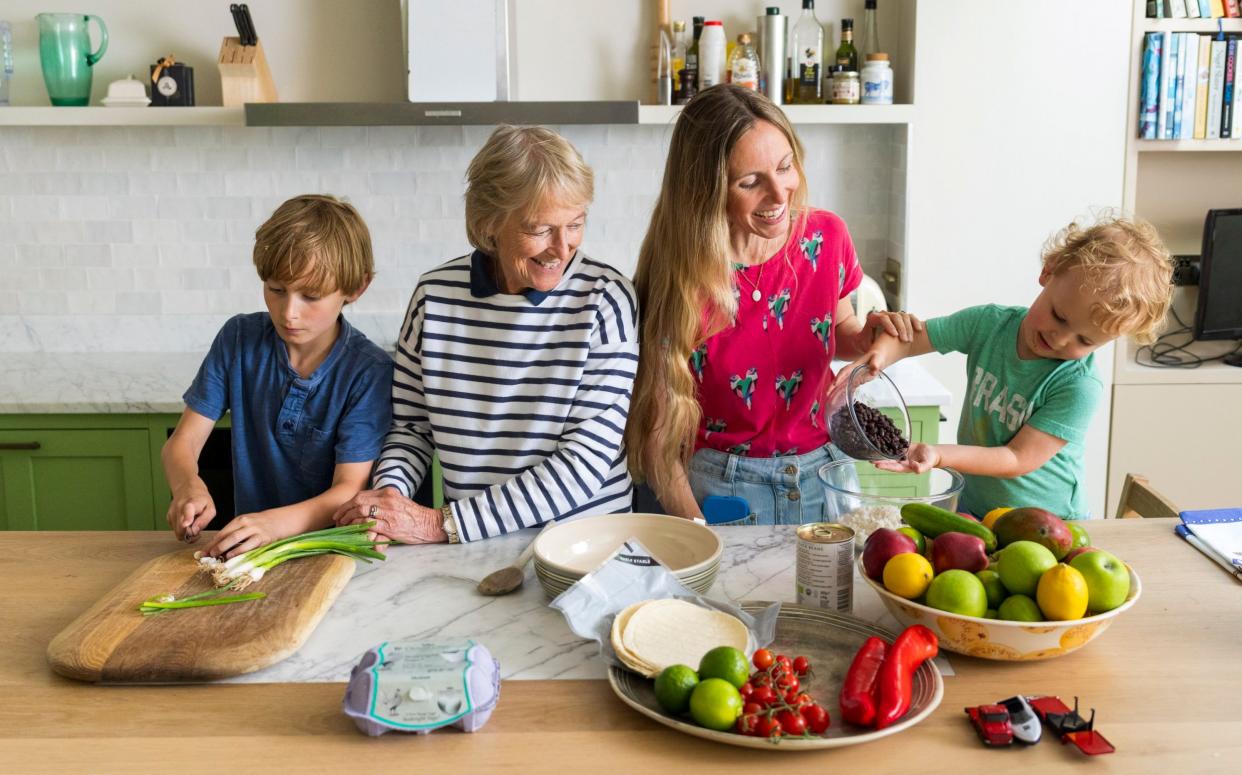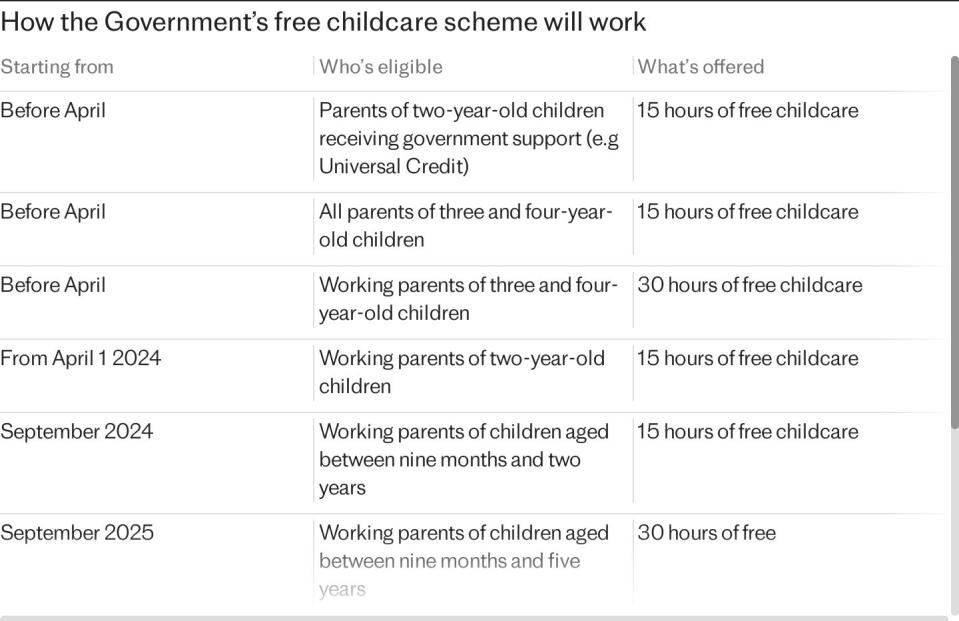How nannies became a dying breed – and started charging six figures

Years ago I had a full-time live-in nanny called Maggie, who arrived from Australia with a suitcase filled with toy koalas. She was 20 and fresh out of nanny school.
Within a matter of days, she’d taken our three children aged four, three and one under her wing and was organising my husband and I with a wall planner and diary.
She was always upbeat, despite working 7am to 7pm, lugging a double buggy around town – I’d arrive home from work to find the kitchen clean and three bathed boys in their pyjamas, ready for a bedtime story.
Friends told me I was mad to employ someone so young, but Maggie was a responsible and committed career nanny. I felt lucky to have met her at the start of her journey.
Now, live-in nannies doing long hours like Maggie are a dying breed. We had three further brilliant nannies but it took ages to find them. Now, seven years and two more children later, I’ve reconciled myself to the fact that a live-in nanny is no longer an option.
It’s not so much the cost – although junior Mary Poppins have got more expensive. A decade ago, when I first hired one, they earned between £18,000 and £20,000 – now the equivalent is £24,000 to £25,000, according to my local nanny agency.
The more pressing problem is that I don’t get any applicants. This is not simply because I have five children, insists Katherine Baker of Abbeville Nannies in south London (although it doesn’t help, obviously), but because live-in nannies are as rare as hen’s teeth.
The stream of young nannies from Australia and New Zealand hasn’t fully picked up since Covid, and those that do come want to live out with their friends. Meanwhile, Brexit has put a stop to young Europeans coming over to look after children, and British nannies have always been reluctant to take live-in roles.
One can see why the younger generation of nannies might question working anti-socially long hours while living with their employer.
Allie Bell, a Norland-trained nanny who now runs her own agency, The Nanny Connection, says that it’s common for nannies to suffer from burnout.
Maggie admits that while she loved her time with us, she wouldn’t do a 7am to 7pm role again. “It’s not a healthy work life balance,” she says.
In an ideal world, I’d hire a live-out nanny just as my parents did when I was a child, but these are a luxury today that only the highest-earning families can afford.
Figures from the latest Nanny Salary Index by Nanny Tax, a payroll service, show the average salary in London is £42,848, up from £34,710 in 2018. Outside London and the Home Counties, nannies earn an average of £35,984, up 11pc from the previous year.
According to Baker, the most junior live-out nannies can earn more than £35,000, and nannies with a few years of experience will be paid £50,000 to £60,000, with the most experienced Norlanders and “super nannies” earning six figures.
“Parents aren’t getting pay rises but nannies’ salaries just keep going up,” explains Baker. “With pension and national insurance on top, nannies are unaffordable for many families.”

You might think that this would lead to nannies dropping their rates, but there’s such a shortage of live-out nannies that they can charge what they like – and specify their hours to avoid early starts and late finishes.
It’s now normal for a full-time nanny to only work four days a week, Bell says. “Nannies have discovered that they have the freedom to do what they like – lots of us work flexibly and they don’t see why they shouldn’t be any different.”
According to Baker, agencies try to tell young nannies that they’re not qualified enough to demand such high salaries but the market is so tight that they’re in a strong position. “If a family is desperate, they will just pay up,” she says.
As a result, families are paying more for their nanny to work fewer hours and are forced to “top and tail” with a childminder or nursery. “I pay my cleaner to watch the children for two hours twice a week as my nanny has requested a later start,” one mother at my son’s nursery tells me.
She also admits to incentivising her nanny to stay with them with extra time off, monthly bonuses and flights. Another family is paying theirs £56,000 a year, even though she is only a wrap-around nanny in term-time – just to keep her from leaving.
Many are giving up on nannies altogether, though. My neighbour, who has a three-year-old and two older children, uses a childminder, nursery and an ad hoc babysitter, even though it’s less convenient. Nannies are covered by the Government’s tax-free childcare scheme, but not by its 15 and 30 hours funding.

“My husband and I are permanently moving children from one place to the next but we can’t afford a nanny anymore, and this way I can claim the Government’s free childcare hours,” she says.
At Abbeville Nannies, part-time and four-day nannies are now the most sought-after among parents, which Baker believes has been fuelled by the advent of homeworking.
Indeed, more than half of nannies are now part-timers, according to Nanny Tax.
“When people commuted into the office each day, they had to have a full-time nanny or send their child to nursery full-time; now they’ll do more of the heavy lifting themselves, doing school runs, extending nursery hours and roping in grandparents to fill in the gaps,” Baker says.
There’s no love lost with full-time nannies, who actively avoid positions where the parents are working from home, as it makes their job more challenging.
Rachel Carrell, founder of Koru Kids, a part-time nanny agency, maintains that this is now the holy grail, as parents are working flexibly themselves and want hybrid childcare that fits around their life.
“Parents with young children want to ‘mix-and-match’ with nursery or spending a day or two with their kids during the week,” Carrell says. “When it comes to older children, we’ve seen demand for wraparound nannies grow by 50pc as parents seek to fill after school hours.”
My own hybrid solution features a nursery, a wonderful Aussie au pair and a part-time experienced nanny. While this might sound like a logistical nightmare, the “team” works well together and no one feels fed up from working too many hours.
We’ll have to come up with a different schedule in the summer holidays, but the joy of flexible childcare is that you can increase or decrease it to suit.
I do miss having Maggie around to help out at breakfast, though, making sure the children have brushed their teeth and packed their school bags. As my husband and I both work from home more often these days, we can usually manage the mornings ourselves as well as the school pick-up, which keeps down our childcare hours.
We’re more tired and things slip through the net more than they used to, but it’s also rewarding and liberating to be in full control over what is happening with the children. I now find it difficult to imagine handing over to a full-time Norland-style nanny, even if I could afford one.
Bell, who is curating an exhibition on the traditional nanny to highlight their changing status, agrees that the modern family wants to be hands on. “Working parents used to leave bringing up their children to a professional, but now they want to be as involved as they can,” she says.
Still, the cost of our hybrid approach is mounting up. When I consider that we’re spending more on childcare than ever, I think of Maggie and how straightforward life was with a full-time nanny.
The way to reinvigorate the traditional nanny, according to Bell, would be for the Government to regulate the industry in the same way as childminders and nurseries. That way, parents could use their free childcare hours entitlement towards their nanny, which would make them more affordable again.
Maggie agrees that regulating nannies makes sense as it would put them in competition with other childcare settings and also raise standards.
“Taking a job as a nanny should be no different to getting a job in a nursery or childcare setting; every nanny should have to go through police checks, first aid and should have a minimum level of training,” she says.
Bell’s “Road to Nanny Regulation” campaign is petitioning the Government to launch a nanny register, ensuring all have DBS checks, a first-aid qualification, and childcare knowledge.
“The Government favours regulated childcare and parents choose it because it’s cheaper,” she says. “If nannies were included in the schemes, full-time nannies would be an option again.”
Would there be any out there to hire, though? Both Baker and Bell insist there are excellent professional nannies out there who would rather work for more “normal” families rather than the super rich.
Judging by the number of qualified Norland nannies I’ve seen looking for part-time roles on the website Childcare.co.uk, though, I’d say that many are only too happy to work fewer hours and leave parents to do their fair share of the parenting.

